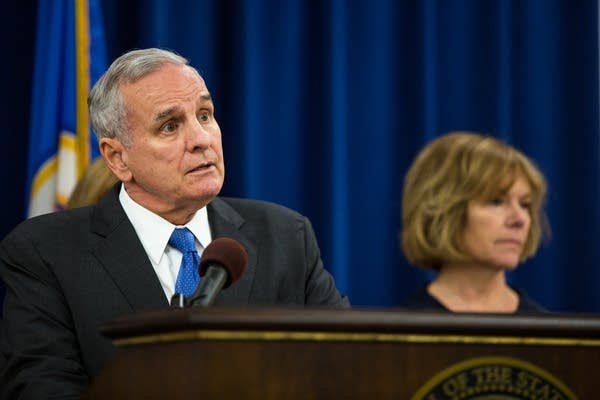Dayton, Smith enter fray in fight over Albert Lea hospital

Go Deeper.
Create an account or log in to save stories.
Like this?
Thanks for liking this story! We have added it to a list of your favorite stories.
Updated: 5:34 p.m. | Posted: 12:15 p.m.
Gov. Mark Dayton and Lt. Gov. Tina Smith Monday said they have "serious concerns" about the Mayo Clinic's decision to end some services at its Albert Lea facility.
Minutes after Dayton and Smith issued their statement, Mayo announced that it will invest more than $3 million in the Albert Lea hospital.
Turn Up Your Support
MPR News helps you turn down the noise and build shared understanding. Turn up your support for this public resource and keep trusted journalism accessible to all.
Mayo wants to end inpatient, intensive care and birthing services at the hospital and consolidate them a half hour away in Austin. Albert Lea will maintain an emergency room, outpatient services and behavioral health services.
In a statement, Dayton and Smith said that Mayo "owes it to the Albert Lea community, and any community it serves, to engage in an open discussion about the impact of its business decisions on people ... especially when a decision like this affects so many."
The decision has been roundly condemned in Albert Lea by community members and public officials.
On Monday, state Attorney General Lori Swanson said Mayo hasn't violated anti-trust law, but she still has questions whether Mayo violated nonprofit laws.
One example: "Has there been money raised in the Albert Lea community for the benefit of Albert Lea that was diverted to another community?" she asked.
Swanson also pointed out that Mayo is benefiting from more than $300 million in taxpayer money the state has pledged for the Destination Medical Center economic development project, which is meant to enhance Rochester and Mayo's international standing.
Mayo says the decision to consolidate services is a financial one: In the past two years, the Albert Lea and Austin campuses have racked up a combined $13 million operating loss. Staffing both facilities adequately and efficiently has proved to be a challenge, the clinic has said.
In the meantime, Mayo said a new group will help Albert Lea understand the changes ahead.
"It's a community advisory panel to look at the impacts of the transitions and how we make sure we are addressing the community concerns," said Kristin Johnson, an administrator for the Albert Lea and Austin campuses.
The discussions could lead to small changes in the transition plan, Johnson said.
Mayo is also conducting a more detailed economic analysis for the transition after Albert Lea officials complained that Mayo's decision-making process was not transparent, she said.



